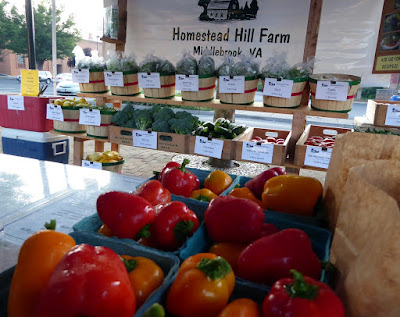 |
| Were potatoes THE most profitable thing? |
It’s that time again. Time to generate those year-end
reports. Time to look at that all-important Profit and Loss Statement.
I’ve been spending a fair amount of time lately “crunching
the numbers”. After all the bills are paid and the earnings recorded, it’s always
interesting to see how it all settles out.
I have to admit, this year certainly hasn’t been one of our
best. There were crop failures of “sure-fire” things and others didn’t perform
quite how we thought they would. Then, there was the whole saga of the sheep…
But, when all was said and done… we finished in the black.
That is a big accomplishment that some say simply cannot be done, particularly
in small-scale agriculture. This is a profitable venture. Perhaps we’re
not up to some people’s standards, but we pay the bills, take care of ourselves
and have some in savings for the big projects without borrowing.
 |
| PRODUCE is definitely the MOST profitable thing! |
Looking at the profit and loss statement, there is no denying that produce is indeed “the most profitable” item. As a matter of fact, if you just look at our annual investment in seeds versus our earnings, the profit margin looks quite impressive. Seriously, it’s downright amazing. If it were simply a matter of buying seeds and then selling vegetables, I would have to suggest that EVERYONE make the investment. You don’t get a rate of return like that most places.
But, there’s much more to growing vegetables than just
throwing a bunch of seeds around and hoping for the best. Beyond the seeding is
the actual growing, the harvest and the ever important marketing and sales. All
these aspects have equal import in creating a success out of our veggie
production.
 |
| early spring marketing |
Still, it’s just a little tempting to look at those little
rows of numbers and focus strictly on the totals. It seems like it would be
easy to make changes so that there would be no losses. (you know, in a perfect world)
…maybe we should forget everything else and grow just one of those amazing crops.
We could be a true specialty farm. What about changing our name to "broccoli hill"?
 |
| mixed lettuce is one of the top earners |
Maybe we should forget about outdoor crops, put up more hoophouses and just grow stuff in there! Look how much mixed lettuce we sold…and you know we always sell out early.
Oh, look how many dozen eggs we sold! We could build a bigger henhouse and get a bunch more hens.
 |
| washing eggs |
…and what about lamb sales?
There is NO way we will ever keep up with demand. More ewes, more
lambs---more lambchops! Yeah.
If we lose the sheep to focus on the gardens, we also lose our source of “free” fertilizer/mulch, affecting the quality of our crops.
 |
| mulching broccoli plants cuts down on weeds and holds in moisture and nutrients |
Besides, we live on what is essentially a rocky
cliff…covered with a thin layer of soil. I can’t imagine attempting to garden
at a 45* angle in the front portion of the farm. Sheep don’t mind the incline.
Then there is the weather…we have just 175 frost-free days
here in the Valley. We could increase hoophouse production. But, hoophouse crops mean that the vast majority of the
work is done on hands and knees. Those aging knees don’t recover like they used
to.
Well, what if we forget the gardens and just raise hens…or
chickens? We sold a whole lot of eggs.
And, as much as I love lamb…changing up our program there
would involve some serious capital investment… at the very least finding more
land to rent. Then there’s the issue of hay storage for wintertime. That would open a whole new set of issues.
Oh, my…talk about opening Pandora’s Box. If we change any
one thing too much, we will upset that delicate balance and perhaps threaten our
overall profitability.
All our various ventures here on the hill work in a sort of symbiotic relationship. If one aspect suffers a loss or failure, one of the
others can pick up the slack. Diversity is our saving grace.
If we focus on finding and producing just THE MOST PROFITABLE THING, we miss
the rest of the pieces of the puzzle that keep this place running and make us "rich in other ways". (click the link to read)
Neither of us wants to focus so much on profitability that we overlook living. Quality
of life is equally important as profitability, even though it does not show up as
a line on the balance sheet.
I think we did pretty well at finding a balance between profitability
and quality of life in the past year.
 |
| offerings for final Market of 2015 |
Let’s just hope we can do it again in 2016!









Congratulations on running a successful farm enterprise for 2015. It is always interesting doing the sums at the end of the year. And you are so right in that chasing the money, the most profitable, doesn't take into account the balance that any farm enterprise needs - environmental, social & economical.
ReplyDeleteI have really enjoyed reading your posts and seeing your photos during 2015. May you have a wonderful 2016.
Happy New Year!
Thanks so much for reading. And, thank you even more for taking the time to comment!
DeleteHope your 2016 is spectacular!